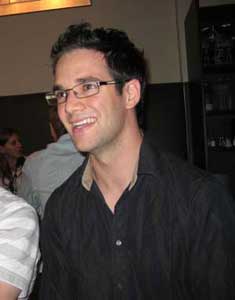Anthony Morley
22 September 2008 | By

Walk through Restaurant 1 at about 1 p.m. on a weekday, and you can’t fail to notice the plethora of languages being spoken. Not only that, the diversity of accents twisting themselves around English or French conversations reveals just how many nationalities are represented at CERN. Nevertheless, listening to Anthony Morley mid-flow is still a bit of a novelty, given that he’s one of only a handful of Australians working on-site on ATLAS.
Now on his third trip to CERN in as many years, University of Melbourne PhD student Anthony splits his time between Inner Detector alignment – ensuring ATLAS knows to a high level of precision where all its various elements are as they inevitably warp and shift over time – and electron track reconstruction. “I maintain an algorithm that tries to estimate electron energy losses much better than the standard track fitters, so we get a better measurement of the original momentum and impact parameters,” he explains.
It was a combination of an inspirational high school teacher, and a natural disposition towards problem-solving that sparked – and continues to drive – Anthony’s interest in his subject. “I guess I like getting to the base of a problem,” he considers, “and you can’t get much more basic than fundamental particle physics! And I like getting my hands on things, so the experimental side appealed.”
As an undergraduate at Melbourne, Anthony studied for a six-year double degree in Physics and Chemical Engineering, spending the fifth year at Imperial College London before returning to complete his Honours year. He laughs a little sheepishly when quizzed about why he studied chemical engineering as well: “I wanted a job,” he admits. But clearly practical thinking wasn’t all that came into the equation, as he adds, “I did physics because it was more interesting.”
His introduction to CERN came during his Honours year, when he worked on a project looking at the problems Melbourne were having in making some of the SCT modules. “From that very much hardware thing, when I started my PhD, I moved straight into a totally software related project,” he says. No-one was more surprised at this turn of events than Anthony himself: “The two things I’d tried to avoid during my undergraduate were learning a foreign language and learning a programming language,” he laughs. “Now I’m doing a PhD where I’m living in France and programming all day. It’s great though!”
Aside from the language, he seems undecided as to what the biggest difference between Geneva and his home town of Melbourne is. “Well, Melbourne’s much bigger, and my family isn’t here,” he begins, before changing his mind: “Melbourne’s a lot better to go out in!” he nods, explaining that he regularly watches bands play when he’s back home. But he’s not done yet, as he comes over all Australian, saying, “No, I miss the waves. Waves are a big thing,” before finally seeming to settle on something: “Ah! The thing I miss the most about Australia – cheap beef!”
Music and meat aside, he cites the best thing about being on the ground at CERN – other than not having to get up at 4 a.m. to link up with meetings here – as being able to collaborate with a wide variety of people directly. “I don’t think there are many places where you can say that you work with people from all round the world towards a common goal,” he says. “I guess the hardest thing about being an Australian working on ATLAS is being so far from the experiment.”
It’s not all bad though. As he’s spent the last three years coming to CERN around May and staying for between three and six months, he’s almost managed to engineer himself an enviable three-year-long summer. He claims not to miss the mild Melbourne winters, but found it strange arriving back into the Australian midsummer when he left Geneva last year in late November: “I got to see the whole snowy build-up [to Christmas] and then returned to a 30 degree day back in Melbourne,” he says, adding, “It’s a shame I’ve never been in Geneva during the ski season though, as I’d love to learn how to ski. Hopefully that will happen in the future.”
If it does, he can add skiing to his list of sporting hobbies, which includes playing football and bowling for the CERN Cricket Club. Though he missed out on going to any of the Euro 2008 matches because he was at Summer School in Belgium, he did get to play in the Swiss Cricket Association League with the CERN team, who this year made it as far as the quarter finals.
Perhaps it’s this sporty streak which makes him not in the least averse to the friendly rivalry which exists between ATLAS and CMS. “We’re competing against each other directly, but that’s a good thing because it means we’re going to push each other,” he says, “as well as check each others’ results.”
As for what he hopes those results might be, he’s not shouting for any particular team. “To me, the popular theories all seem like educated guesses. All of them have their strong points and their weak points,” he reasons. “The only thing we can say with confidence is that the LHC should find something.”
And Anthony is keen to be around when that happens. He’s due to finish his PhD in the next year, but hopes for the chance to continue working with ATLAS after that. “With data coming, hopefully very soon, it makes it very exciting,” he smiles, “and I really don’t want to miss out on that.”



